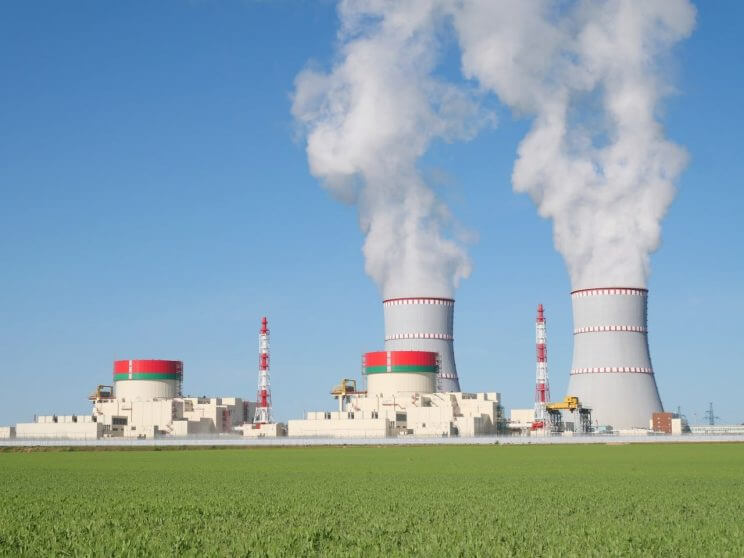Minsk has not learned any political lessons from the construction of the nuclear power plant (NPP) near Astraviec. The ill-considered choice of the site is a source of political tension between Belarus and Lithuania.

Despite European Union countries’ refusal to buy power from the plant, Alaksandar Łukašenka is optimistic. Moreover, he considers building another plant.
More electricity generated, less power exported
“It wouldn’t be bad to have a second nuclear power plant. It is a very, very profitable business,” Łukašenka said on October 20. According to him, two options are currently being considered: the construction of two more units at the Astraviec NPP or of a second NPP in the Mahilou district.
The fact that Łukašenka uses the word “very” twice instead of concrete figures is significant: it means that he has nothing to show for it.
Indeed, the statistics show that in 2020, when the NPP was put into operation, electricity exports from Belarus declined sharply.
Electricity exports from Belarus, million kWh

* for 2021-2023, data for Ukraine only. The government would not disclose information on exports to Russia and other countries.
Data: Ministry of Energy of the Republic of Belarus, Ukrenergo, author’s calculations
The reason is obvious: Lithuania and other Baltic states have declared that they will not buy electricity from the Astraviec NPP because they consider it a threat to their national security. Since it is technically impossible to distinguish the source of electricity in the grid, their only option was to completely discontinue imports from Belarus.
Vilnius says that electricity from Russia purchased by Latvia could technically include some power generated by the Belarusian NPP. It is unknown how this generation is accounted for in the settlements between Belarus and Russia – official data on electricity exports have not been disclosed since 2021.
Minsk overlooks political consequences
Belarus could have avoided tension with Lithuania if it had not built the plant so close to Vilnius. But Minsk did not calculate the political risks, or at least did not take them sufficiently into account.
The government first considered several sites in different parts of the country and finally decided on Astraviec, citing “technical reasons.” Even if it was a good location from the geological point of view, from the political point of view it was the worst option.
The International Atomic Energy Agency found the Belarusian NPP to be safe. Minsk, however, failed to convince Lithuania.
Nowhere to sell power
According to Ukrenergo, Belarus supplied Ukraine with more than 1.1 billion kWh in 2021 and 800 million kWh in January-February 2022. However, Ukraine does not import electricity from Belarus any longer.
Kiev has long planned to disconnect from the Belarusian and Russian power grid and integrate into the European grid. In preparation for the disconnection, Ukraine stopped importing electricity from Belarus one day before the war broke out.
Jauhien Makarčuk, an analyst at the iSANS Department of Energy Security, said that Belarus has lost the electricity markets of Ukraine, Poland and the Baltic States for the foreseeable future, not only for political, but also for technical reasons.
After the outbreak of the full-scale war, Europe helped Ukraine to quickly and fully synchronize its energy systems with the European power grid. The Baltic States will do it in 2025. Electricity imports from Belarus will be technically impossible unless expensive equipment is installed at the border.
Belarus and Russia plan to establish a single electricity market by 2027. However, if Moscow does not offer Minsk preferential terms, selling electricity to Russia makes no economic sense because of oversupply.
Saving cheap gas
With electricity exports having failed, Minsk is now boasting of saving other energy sources. Alaksandar Zacharevič, deputy head of the Department of Energy Efficiency, Ecology and Science at the Ministry of Energy, predicts savings of 4-4.5 billion cubic meters of imported natural gas per year once the Astraviec NPP is fully operational. Zakharevich estimated that the NPP already saved about 5 billion cu meters of gas worth $600-650 million for the entire period of operation.
However, senior BEROC researcher Zmicier Kruk noted that in 2022 Belarus bought Russian gas at a staggering discount of 90 percent from the European spot market prices and estimated savings at $18.3 billion, or 25 percent of GDP.
Belarus has not even begun to repay the $5.36-billion Russian loan spent on the NPP. Repayment was postponed until April 1, 2024, symbolically, official Day of Unity of Belarus and Russia.
Łukašenka’s nuclear ambitions
The Belarusian ruler boasts that the share of nuclear power in Belarus’ energy consumption is higher than in Russia or the United States (about 20% in both countries).
Electricity generated by the NPP’s first unit accounts for 20 percent of Belarus’ annual consumption, said Viktar Karankievič, minister of energy. The proportion is to rise to 25 percent by the end of 2023 with the commissioning of the second unit.